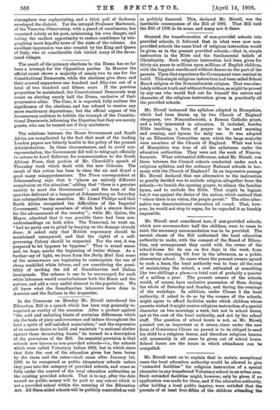In the Commons on Monday Mr. Birrell introduced the Education
Bill in a speech which has been very generally re- cognised as worthy of the occasion. After a protest against "the cold and unfeeling blasts of sectarian differences which nip the buds of piety and reverence and induce throughout the land a spirit of self-satisfied materialism," and the expression of an earnest desire to build and maintain "a national shelter against those devastating blasts," he turned to a description of the provisions of the Bill. Its essential provision is that schools now known as non-provided schools—i.e., the schools which were called Voluntary before 1902, but in which since that date the cost of the education given has been borne by the taxes and the rates—shall cease after January 1st, 1908, to be recognised as public elementary schools unless they pass into the category of provided schools, and come as fully under the control of the local education authorities as the existing provided schools. That is to say, after the date named no public money will be paid to any school which is not a provided school within the meaning of the Education Act. All State-aided schools will be publicly controlled as well
as publicly financed. This, declared Mr. Birrell, was the inevitable consequence of the Bill of 1902. That Bill held the Bill of 1906 in its arms, and many saw it there.






































 Previous page
Previous page